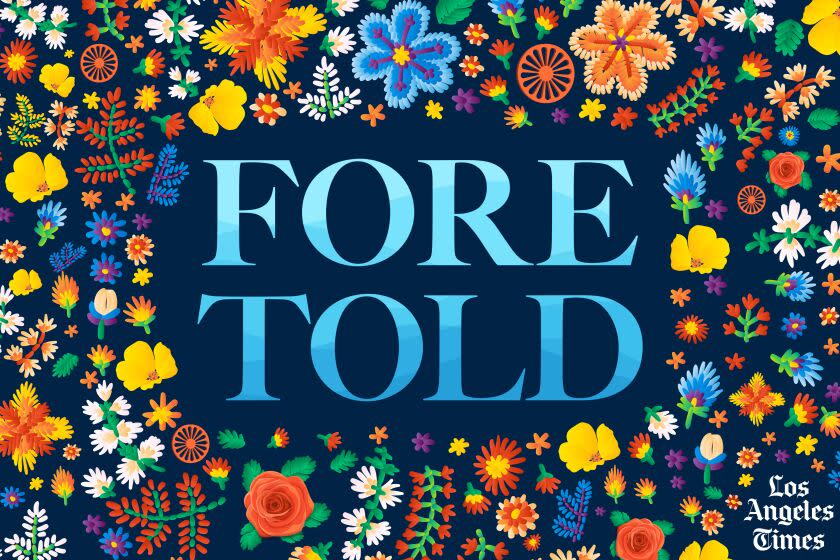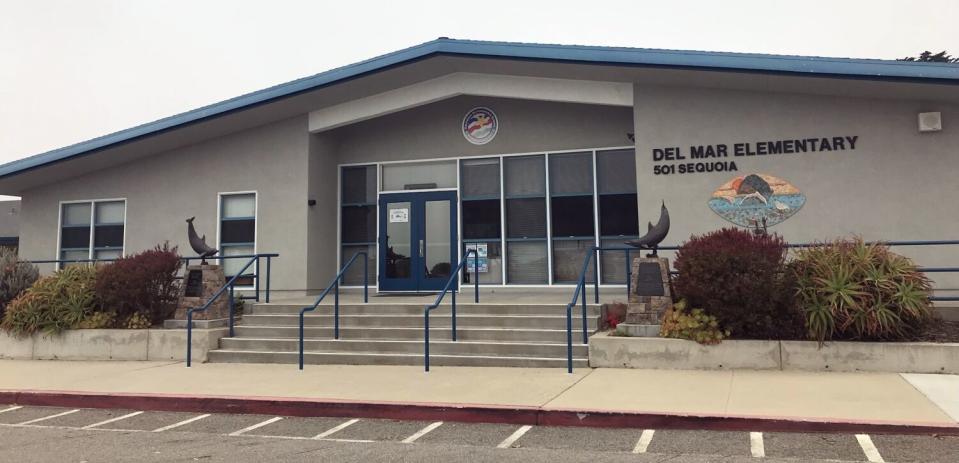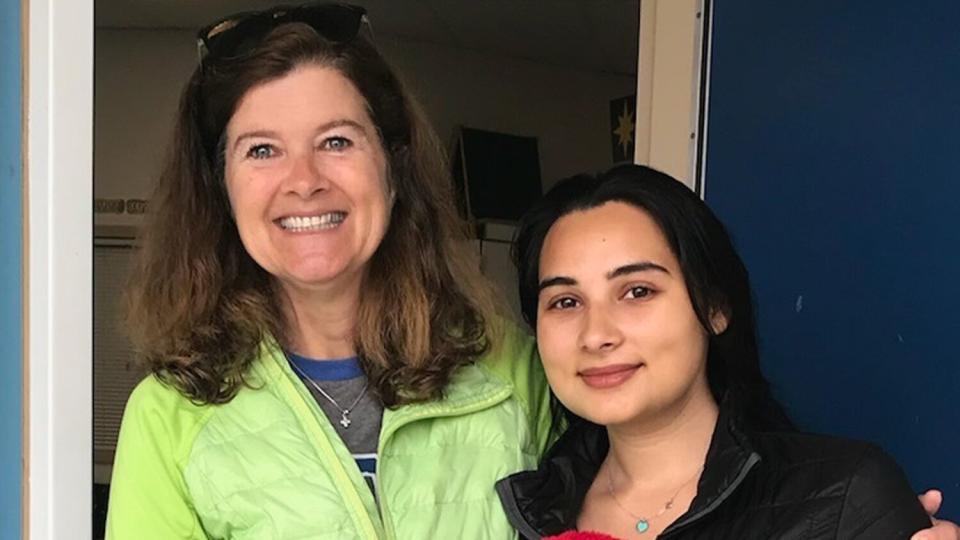How kindergarten is an existential threat

Episode 2: "A Certain Kind of Education." We go back to where it all began: Morro Bay. Paulina shows Faith her hometown, where she recounts a childhood in a tightknit family, vibrant parties and an education cut short.
Read the episode transcript.
See all episodes and extras.

Last week, I informally polled the L.A. Times newsroom. Very informally:
Please emoji ✋ if you VIVIDLY remember your first day of kindergarten.
Please emoji 🤏 if you remember the feeling of it, or the emotion of it, but don't really remember details.
Please emoji 👎 if you don't remember it at all.
Of the 80 people who responded, eight said they vividly remembered their first day of kindergarten, 22 said they remembered the feeling of it, and 50 people said they had no memory of that day whatsoever.

Surprisingly, for such a landmark day in our early lives, the memory of it is just about as hazily familiar as the rest of our early childhood memories. I remember the buzz of energy as parents dropped off their children and the echo of little footsteps in a concrete hallway but not much else.
For some kids, the first day of kindergarten is their first exposure to an entirely new environment outside of the cocoon of familiar home life. It’s an overwhelming experience for any child, but for Paulina Stevens, who had very little interaction with anyone outside her family, it was especially traumatic.
The first day, I was just crying the whole entire day, I remember, until the very last moment that I got picked up from school.
Paulina Stevens in “Foretold”
Many kids cry during the first day of school — some just in the morning, some all day. But Paulina wasn’t just crying because of the shock of this new world. She was also carrying a secret.
The only thing before any school year was like, “Don't tell anyone you're a Gypsy.”
Paulina Stevens in “Foretold”
And so Paulina experienced a unique beginning to her education. As a bicultural kid myself, I can only imagine what it was like to have a home life so vastly different from what is projected at school, yet not be able to express the confusion that inevitably results from straddling two opposites. Paulina’s home life as a child was loud and carefree, filled with family and parties. At school, Paulina was expected to line up, raise her hand, and ask permission before going to the bathroom.
And so, perhaps, this is why Paulina remembers her few years of school with mixed feelings.

On the one hand, she was learning so much and absorbing this new world with curiosity. One teacher remembered her as a creative student. She had dreams to become a veterinarian. But on the other hand, she was hiding herself, never able to fully share and bond with others. She knew that eventually she would be pulled out of school, so what was the point? Her curiosities would remain unfulfilled and her friendships surface level. After sixth grade, she stopped attending school altogether.
This isn’t unusual among traditional Romani Americans. Many pull their children out of formal public education in order to protect them from the encroaching influence of the gadje — outsiders.
As we began to learn in “Foretold” Episode 1, the distrust of gadje, or anyone who is not Romani, has built over centuries. In an effort to protect their communities and preserve their culture, Romani parents instilled in their children an aversion to gadje. This week we learn about the concept of marimé, a spiritual uncleanliness.
You risk becoming polluted by going into the non-Romani world.… We think that not only are gadje unclean, but by socializing with them, we can become unclean too.
Professor Ian Hancock in “Foretold”
This uncleanliness doesn’t only come from interaction with outsiders. Many things can be marimé, including food preparation and personal hygiene. This episode dives into how this concept evolved from a hygienic and spiritual practice to a lifestyle.
It rests on the idea that you can be physically unclean and you can also be spiritually unclean. And you can take care of physical uncleanliness by washing yourself. But you could only take care of spiritual uncleanliness by living according to a certain way of life.
Professor Ian Hancock in “Foretold”
Ultimately, avoiding a state of marimé is a way of differentiating insiders from outsiders. The practice makes attending public school a field of landmines.
You cannot even eat food cooked by gadje. So what’s the kid going to do at lunchtime in the cafeteria? You cannot sit next to the opposite sex in class. What are the kids going to do?
Professor Ian Hancock in “Foretold”
Of course, just as with any spiritual or cultural practice, there are degrees of adherence. Paulina did attend school for several years — as long as her family deemed appropriate. She had one foot in one culture and one foot in another. Why couldn’t she comfortably continue that way through high school graduation and beyond? People of various minority cultures already do this.
But they do it at a cost.
Sending children off to an institution designed to teach them how to read, write, and assimilate to a mainstream American society presents an existential threat to a minority culture. The more time you spend reciting the pledge of allegiance, the less time you have to learn, say, the Romani language at home. Day after day, year after year, that repetitive exposure to the mainstream metabolizes in you until you’re irrevocably changed.
Listening to Paulina’s childhood memories, I recalled a way I too was forever altered by the force of assimilation and, in my case, childish laziness. I was 6 years old, accompanying my mother to a parent-teacher conference. At home I spoke only Spanish, my first language. It was tiresome to constantly toggle from English all day at school to Spanish at home, but I had to do it because my mom didn’t speak English.
Imagine my surprise when, that fateful afternoon, she and my teacher carried on an entire conversation in English without even looking to me for a translation.
I petulantly refused to respond in Spanish for years after that, despite my tired mother’s best efforts. Now I speak Spanish meekly and with a very noticeable pocha accent. I wish I had kept it as pure as it was when I was 6.
From time to time I get emotional about it, thinking about how I can never express my full self to my cousins in Sonora — I don’t have the words to convey my personality. I will always be separated from my family by the scar tissue of my assimilation. The idea of traveling back to my “homeland” fills me with the deepest insecurities. I have permanent imposter syndrome for the culture I was born into.
So I get it. Kids are impressionable. Languages, practices and customs are only as strong as people’s dedication to them.
But Spanish is still a major language, and my Mexican culture is not in danger of extinction. Romani culture, with a much smaller population, is much more vulnerable.
I think part of this story, too, is this fear that the culture is being diluted, and what do you do with that and how do you preserve it?
Faith E. Pinho in “Foretold”
Well, you preserve it by being strict. And this is going to sound weird, maybe, but in our case, I believe in segregation. I know that’s a terrible word.
Professor Ian Hancock in “Foretold”
There is nuance here somewhere between an uncomfortably charged term like "segregation" and the idea of shielding one’s offspring, the bearers of your cultural history, from the slow creep of assimilation and erasure.
Now, imagine being a child, learning the joy of your culture, the only way of life you know, and then being taught to hide it from your peers. For what? You don’t know, but it feels bad. As a child, the nuance and complexity doesn’t register fully, if at all. The effects are just understood emotionally, as it was in Paulina’s memory when she recounts what happened after a teacher approached her father and mentioned knowing their Romani identity.
He told my mom. He was like, “They know that we're Gypsies, and, you know, should we leave? Is that bad?” He didn't really know. And then after that, he was fine with it.... But just that initial moment, I guess, sparked a little fear.
Paulina Stevens in "Foretold"
And so the discomfort in Paulina’s early education wasn’t just first-day-of-school jitters or the growing pains of an adolescent life, it was many things at once. A fear of discrimination. A risk of becoming marimé. A falling stone in the erosion of Paulina’s dedication to the lifestyle in which she was raised. But it was also the seed of change — and whether change is culture evolving or culture eroding depends on who you ask.
— Jazmín Aguilera

Go even deeper
There is no monolithic "Romani American experience," not even in California — there are a multitude of them. Author Oksana Marafioti shares her recollections of how arriving in Los Angeles as a teenager led her to celebrate the various parts of her heritage.
This story originally appeared in Los Angeles Times.

